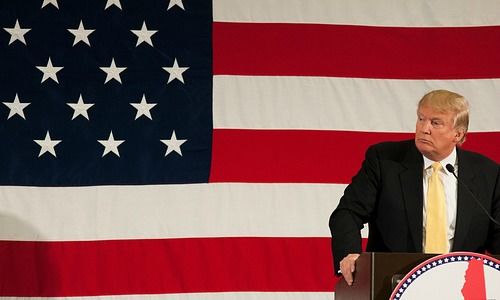Donald Trump, or America’s Brexit
With his election to U.S. president, Donald Trump has achieved the American analogy to Brexit – but with global consequences. finews.asia reporter Peter Hody visited several post-election venues in New York.
Donald Trump pulled off a political sensation with his election as the 45th president of the United States. The political and economic consequences of the move are still completely unknown.
New York, the world’s most important finance center and its most cosmopolitan city, had nearly no influence in the elimination round, a striking resemblance to to London’s role in the June 23 vote to leave the European Union.
New Voters Mobilized
New Yorkers expressed their relief as «Super Tuesday» approached that a sorted 18-month election campaign would soon end, a view echoed across the nation. Never has the U.S. had to choose between candidates as deeply unpopular as Trump and Hillary Clinton.
Despite being despised in many quarters, even in his own party, the 70-year-old Trump achieved in his unpopularity what broke Clinton in the primaries: he touched a popular nerve and managed to mobilize voters who hadn't registered in countless pre-vote polls.
Perceptible Dislike
New York voted traditionally democratic, with its traditional low voter turnout. New Yorkers don’t like Trump histrionics, nor do the Clintons, who are considered carpetbaggers, appeal to cosmopolitan voters.
This dislike was tangible on election day. Assuming a Clinton victory, as polls had forecast, finews.asia visited an election night event billed as an «extravaganza» at the hip «Bell House» in Brooklyn, where a young, liberal and affluent middle class has settled.
Increasing Consternation
Mike Pesca, a «Slate» magazine podcaster and political commentator, took the stage and told several bawdy jokes about the Republican candidate. As results began trickling in, Pesca grew more muted and consternation spread among the crowd as confidence in a Clinton win faded.
finews.asia then headed for Manhattan, but instead of looking for an election night party in the financial heart of New York, we visited a Trump Tower on Fifth Avenue. Even at the very spot where Trump’s campaign began 18 months ago, turnout of his supporters was negligible.
What happened on Tuesday night? Trump managed to trounce all expectations and win a majority of electoral college votes as well as the popular vote, drawing in key battleground states like Ohio, North Caroline and Florida. The reason: Trump galvanized and mobilized voters who hadn’t been tracked in any of the pre-election polls.
Let Down
The map of Trump states shows the essence of his success: he won the Rust Belt, the Bible Belt, and the Midwest – the states which have been hardest hit by the demise of the coal and steel industries and which reject a multicultural society the strongest.
An increasing portion of the American population is disenfranchised with globalization, refuses to see the benefits of free trade, and feels let down by elites in Washington and New York.
Racist Overtones
For them, Trump is the outsider who has never been part of the Washington political elite and who they believe can dismantle the archaic and increasingly oligarchic establishment structure in the incestuous political and business establishment. They have bought into his «Make America Great Again» slogan.
Trump gave little indication during his campaign of how and with which type of politics he plans to do this. A billionaire real estate tycoon, Trump appears to be a winner in the political system which has let down so many. But both that as well as his racist sexist overtones and his often vulgar manners appear to have mattered to voters.
Great White Hope
Trump is an empty canvass onto which voters can project a better life, even if the candidate is sketchy on how this can be achieved. Like Brexit in the U.K. in June, Trump’s election isn't a vote of reason but of protest – and of the hopes of a vast, quietly frustrated majority.
What about the consequences? The parallels to Brexit are easy to draw here too, and the dramatic reaction of financial markets is an obvious one. Trump fosters uncertainty, but with a global knockoff effect.
More Uncertain than Brexit
Trump stands for anything but continuity as U.S. president. Will he quit free trade agreements? Introduce radically oppressive immigration policy? Lower taxes? Isolate the U.S.? Inflame a new war in Syria, reverse a nuclear deal with Iran, freeze relations with Cuba again, ease banking regulation, oust U.S. Fed chairwoman Janet Yellen?
There is a common theme among Trump’s announcements and campaign promises: the 70-year-old anti-politician has never disclosed how he plans to implement them. This makes the consequences of Trump’s election extremely unpredictable and more uncertain than those of Brexit. One is tempted to read hope into his campaign slogan of making American great again.




























